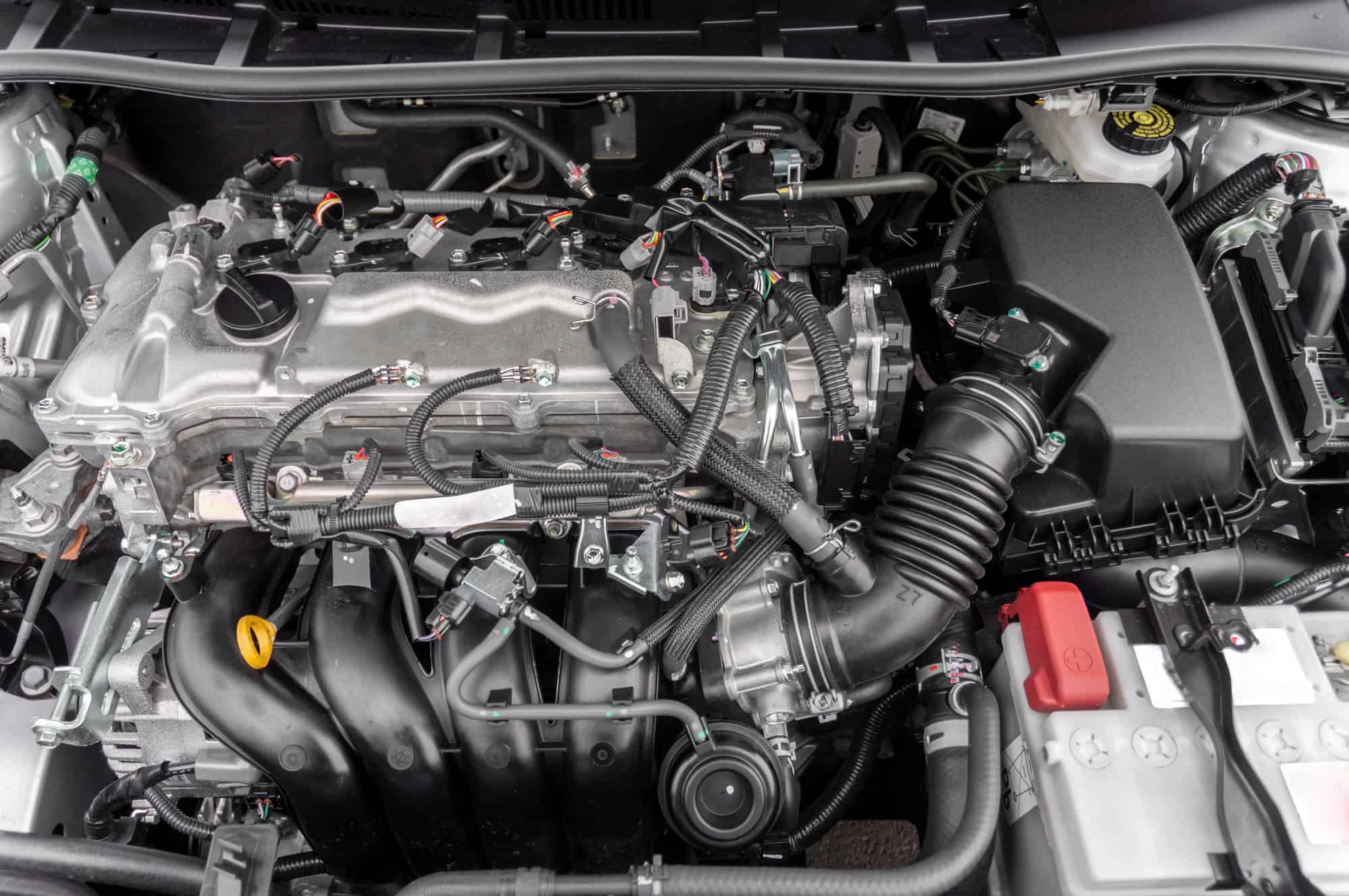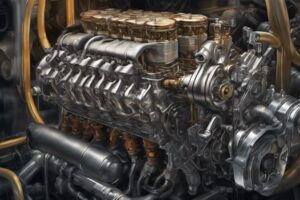A flashing check engine light can indicate a problem with an engine sensor, a vacuum leak, a problem with fuel delivery, fuel ignition or a major mechanical problem resulting in engine misfire.
If you don’t have access to an OBD diagnostic tool, it’s sometimes not that easy to figure out what exactly a flashing check engine light is trying to tell you.
However, you shouldn’t ignore it as a the check engine light is usually triggered to warn you about something wrong with the engine in your vehicle.
Why Is The Check Engine Light Flashing?
The most common reason for a flashing check engine light is an engine misfire, which occurs when unburned fuel enters the exhaust system. This can lead to your car stalling and increased temperatures in the catalytic converter that can potentially cause critical damage.
The check engine light can turn on for many reasons and usually flashes because the ECU has detected a problem with the engine. The problem may be mechanical or electrical. Here are some of the most common reasons for the check engine light to flash:
| Cause | Description | |
|---|---|---|
| 1 | Catalytic converter damage | A damaged catalytic converter can cause the check engine light to flash. This can be caused by misfiring spark plugs, a faulty oxygen sensor, or other issues. |
| 2 | Ignition system problems | Issues with the ignition system, such as a failing ignition coil, spark plug, or spark plug wire, can cause the check engine light to flash. |
| 3 | Fuel system problems | Problems with the fuel system, such as a clogged fuel injector or fuel filter, can cause the check engine light to flash. |
| 4 | Engine overheating | An overheating engine can cause the check engine light to flash. This can be caused by a malfunctioning thermostat, water pump, or other cooling system components. |
| 5 | Vacuum leak | A vacuum leak can cause the check engine light to flash. This can be caused by a cracked or damaged vacuum hose, intake manifold gasket, or other components. |
| 6 | Transmission problems | Transmission problems, such as a failing torque converter or transmission control module, can cause the check engine light to flash. |
| 7 | Faulty sensors | Faulty sensors, such as the oxygen sensor or mass airflow sensor, can cause the check engine light to flash. |

The ECU is constantly checking your engine performance by receiving real time information from its sensors. As soon as a problem is discovered the ECU reacts, by comparing sensor information that it is expecting with actual live information.
Depending on the problem, the check engine light might flash or can turn a constant red or yellow.
The check engine light usually flashes if it detects an engine misfire. There are usually two engine systems that could be responsible for an engine misfire and a subsequent flashing check engine light.
Reason 1. A problem with the ignition system
A faulty ignition system will not be able to ignite the fuel properly and thus cause a misfire.

Faulty ignition coils can cause the check engine light to flash
Engine Misfires can be caused by a problem with the Ignition System, these problems can be caused by:
- Bad or defective spark plugs
- Oil on one or more spark plugs
- Bad or deficient spark plug wires
- Bad or deficient ignition coil(s)
- A bad or defective crank position sensor (CKP)
- A bad or defective cam position sensor (CMP)
Reason 2. A Problem With the Fuel Delivery System.
On the other hand, a poor fuel delivery will cause a lean mixture condition that also will trigger engine misfires.
Fuel related Engine Misfires can be caused by:
- Bad, deficient or clogged fuel pump
- Bad or clogged in-line fuel filter
- Bad or clogged fuel tank filter
- A bad or deficient fuel pressure regulator
- Bad or deficient fuel injector(s)
- A bad, deficient or clogged mass air flow sensor
- A severe intake manifold leak

In most cases, using a professional automotive scanner is the best way to diagnose and determine what component is at fault.
Common Check Engine Misfire Symptoms
Along with a blinking check engine light, you may experience one of the following symptoms:
- Rough idle
- Difficulty in starting your engine
- Poor fuel performance
- Lack of power
- Distinctive misfire sound on your engine
- Gas smell on your tailpipe
- Rotten eggs smell coming from your tailpipe
- Black smoke coming from your tailpipe
Flashing Check Engine Light Codes – what are the most common?
The check engine light comes on when the ECU logs a problem with the engine. Every error stored in the ECU has a particular “P” code associated with it.
When the check engine light lights up, the best way to figure out what’s going on is to hook up a diagnostic reader to read the stored codes. Once you have the code(s) then it’s a lot easier to identify the faulty component.
Here are a few of the most common P codes associated with the check engine light.
- P0300 – Random Misfire Detected Code
- P0440 – Evaporative Emission Control System Malfunction
- P0401 – Exhaust Gas Recirculation (EGR) Flow Insufficient Detected
- P0420 – Catalyst system efficiency below threshold (Bank 1)
- P0299 – Turbocharger/Supercharger A Underboost Condition
How Much Does It Cost To Repair A Flashing Check Engine Light?
The cost to repair a flashing check engine light can vary depending on the cause of the issue and the cost of parts and labor in your area. On average, you can expect to pay anywhere from $100 to $1,500 or more to repair a flashing check engine light issue.
However, the cost can be higher if the issue is more severe, such as a damaged catalytic converter or transmission control module.
In many cases, it is a cheap fix and can be resolved by changing some service items such as spark plugs or engine filters. This can cost between $50 and $100, and maybe a bit more if you hire a mechanic to do the work.
What should you do if the Check Engine light starts Flashing?

Modern engines are complicated and it can be difficult to figure out what is wrong when you see the check engine light
If the check engine light comes on at start up then don’t drive the car. If it comes on when you are driving then pull over as soon as it is safe to do so.
Driving your car with a flashing or solid (not flashing) check engine light can cause serious damage to the engine, as outlined above.
Once you are parked safely, you should perform a quick inspection of your engine as follows.
- If possible, take note of the engine coolant temperature value in the instrument panel. Shut off the engine immediately if you suspect the temperature is above normal values.
- If the temperature is normal then open the hood and look for abnormal noises in the engine. If you hear any unusual sound then shut off the engine.
- Assuming everything is normal (temperature and sounds) go around to the back of your car to check for signs of problems from the exhaust. Any gas smell, rotten eggs smell or blue, white or black smoke is a bad sign. Shut off the engine if necessary.
- If you don’t know how to fix the problem yourself then call your mechanic or tow service.







I recently noticed that my check engine light started flashing, but I haven’t noticed any unusual sounds or smells from my car. Could this still indicate a severe problem, and should I stop driving immediately even if the car seems to be running smoothly?
I recently noticed a flashing check engine light on my car dashboard when I was driving home. It worried me because I was unsure if I could continue driving without causing any serious damage to my car. What should I do if the check engine light starts flashing while I’m driving? Is it safe to continue to my destination, or should I stop immediately and call for assistance?